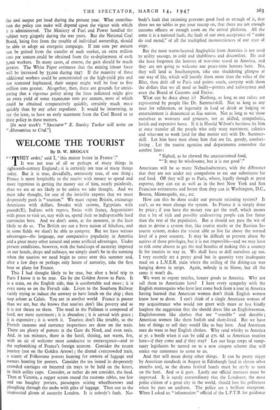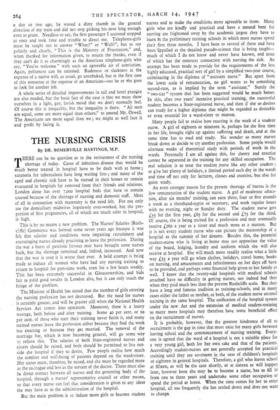WELCOME THE TOURIST
By D. W. BROGAN
It was not true of all or perhaps of many things in tighteenth-century England ; it is certainly not true of many things today. But it is true, dreadfully, ominously true, of one thing ; France is more hospitable to the tourist with money to spend and more ingenious in getting the money out of him, nearly painlessly, than we are or are likely to be unless we take thought. And we must take thought, for one of the invisible exports that we must desperately push is "tourism." We must export Britain, encourage Americans with dollars, Swedes with crowns, Egyptians with pounds(E), Indians with rupees, Swiss with francs, Argentinians with pesos to visit us, stay with us, spend their so indispensable hard currencies here. And we don't seem, at the moment, in the least likely to do so. The British are not a born nation of hoteliers, and in some fields we shan't be able to compete. But we have serious advantages—the language, our comparative popularity. in America and a great many other natural and some artificial advantages. Under present conditions, however, with the handicaps of austerity imposed on our hotels, shops and railways, we simply shan't be in the running when the tourists we need begin to come over this summer and, after a few days or perhaps only hours of austerity, take the first boat or plane for France.
This I had thought likely to be true, but after a brief trip to Paris I know it to be true. Go by the Golden Arrow to Paris. It is a train, on the English side, that is comfortable and more ; it is even more so on the French side. Listen to the Southern Railway vainly trying to induce the unwary to have lunch on the ship ; then step ashore at Calais. You are in another world. France is poorer than we are, but she knows that tourists don't like poverty and so it is not thrust on them. The meal in the Pullman is composed of food, not mere nutriment ; it is abundant ; it is served with grace ; it is expensive ; it is worth it. Tourists don't like trouble, so the French customs and currency inspections are done on the train. There are plenty of porters at the Gare du Nord, and even taxis. And, in ten minutes, there is the hotel, shining, not warm, hot, with an air of welcome most conducive to extravagance—and to the replenishing of France's foreign account. Consider the return journey (not on the Golden Arrow); the dismal cvercrowded train, a scurry of Folkestone porters hunting for owners of luggage and owners hunting for porters. Consider the tea issued in desperately crowded carriages on battered tin trays to be held on the knees, in thick utility cups. Consider, or rather do not consider, the food. Then at Victoria, a rugger scrum round the customs tables, too few and too haughty porters, passengers seizing wheelbarrows and ploughing through the mobs with piles of luggage. Then out to the inspissated gloom of austerity London. It is nobody's fault. No-
body's fault that rationing prevents good food or enough of it, that there are no tables to put your teacup on, that there are not cnough customs officers or enough room on the arrival platform. All the same it is a national fault, the fault of our own acceptance of "make do and mend," of all the multiplied inconveniences of our state of siege.
But the most warm-hearted Anglophile from America is not used to utility sausage, to cold and shabbiness and discomfort. He and she have forgotten the horrors of war-time travel in America, and they are not going to welcome our peace-time horrors here. No, they will land at Southampton, take one shuddering glimpse at our way of life, which will horrify them more than the relics of the Blitz, then drift off to Paris and points south, carrying with them the dollars that we all need so badly—porters and railwaymen and even the Board of Customs and Excise.
What can be done about it? Nothing, as long as our rulers are represented by people like Dr. Summerskill. Not as long as any taste for refinement or ingenuity in food or drink or lodging or entertainment is denounced as lese nation. Not as long as we show ourselves as wowsers and grousers, not as skilled, sympathetic, lavish and expensive hosts. If it is Harold Wilson's business let him at once transfer all the people who only want nutriment, calories and what-not to work (and for that matter eat) with Dr. Summer- skill. Let him have men about him that are fat, greedy, comfort- loving . Let the tourist agencies and departments remember the sombre lines:
"Sighed, as he chewed the unaccustomed food, " It may be wholesome, but it is not good '."
Americans will be so many Nebuchadnezzars, with the difference that they are not under any compulsion to eat our substitutes for real food. Off they will go to Paris, where, legally though at great expense, they can eat as well as in the best New York and San Francisco restaurants and better than they can in Washington, D.C., Boston, Minneapolis, etc., etc.
How can this be done under our present rationing system? It can't, so we must change the system. In France it is simply done by price ; if you have the money you get the stuff, which means that a lot of rich and possibly undeserving people can live fatter than the rest of the population. But it should not pass the wit of man to devise a system that, like tourist marks or the Russian In- tourist system, makes the visitor able to live far above the normal level of a poor country. It may be difficult to prevent abuse by natives of these privileges, but it is not impossible—and we may have to risk some abuses to get the real benefits of making this a country fit for tourists to stay in. We shall have to doll ourselves up too. I very recently ate a pretty good but in quantity very inadequate meal on a L.N.E.R. train where the ceiling of the dining-car was hanging down in strips. Again, nobody is to blame, but all the same it won't do.
We want to export textiles, luxury goods to America. Why not sell them to Americans here? I have every sympathy with the English mannequins who have just come back from a tour in America having learned that American women don't think English women know how to dress. I can't think of a single American woman of my acquaintance who would not greet with more or less kindly laughter the suggestion that she should dress like an Englishwoman. Englishwomen like clothes that are " sensible " and durable ; American women like them foolish and short-lived. But we have lots of things to sell they would like to buy here. And American men do want to buy English clothes. Why send whisky to America at 5s. a bottle when it can be sold at 27s. 6d. to American tourists here—if they come and if they stay? Let our large corps of sump- tuary legislators be turned on to a new coupon scheme that will entice our customers to come to us.
And that will mean doing other things. It can be pretty nippy by American standards in August in Edinburgh (and in eleven other months too), so the drama festival hotels must be realy to turn on the heat. And so it goes. Lastly our official manners must be improved. It is surely extraordinary that the Londoner, the most polite citizen of a great city in the world, should lose his politeness when he puts on uniform. The police are a brilliant exception. When I asked an "information" official of the L.P.T.B. for guidance
a day or two ago, he waved a dirty thumb in the general direction of my train and did not stop picking his nose long enough even to grunt. Needless to say, the first passenger I accosted stopped at once and took time and trouble to direct me. Telephone-girls must be taught not to answer "What?" or "Well?", but to say politely and clearly, "This is the Ministry of Frustration," and, when thanked for information given, to return the thanks, even if they can't do it as charmingly as the American telephone-girls who say, "You're welcome" with such an agreeable air of conviction. Again, politeness can be rationed. Rudeness or slackness at the expense of a native will, as usual, go unrebuked, but at the first case of this nonsense at the expense of an American—out he or she goes to look for another job.
A whole series of detailed improvements in rail and hotel practice are also needed, but the basic fact of the case is that we must show ourselves in a light, gay, lavish mood that we don't normally feel. Of course this is inequality, but the inequality is there. "All men are equal, some are more equal than others," to amend Mr. Orwell. The Americans are more equal than we ; we might as well face it and profit by facing it.



































 Previous page
Previous page